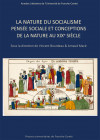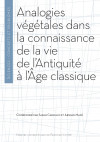
- Résumé
-
Après un premier volume sur les Analogies végétales dans la connaissance de la vie de l’Antiquité à la première modernité (2023), ce deuxième ouvrage entreprend de penser ce que nous avons de commun avec les plantes. En conviant sciences et philosophie dans une histoire longue qui court des Présocratiques aux sciences contemporaines, ce livre explore les processus communs entre les plantes et les hommes en ce qu’ils organisent et informent les vivants. L’analyse épistémologique et ontologique des savoirs scientifiques permet d’intégrer les humains dans les agencements d’échelle qui opèrent à travers les flux et échanges entre vivants.
- Sommaire
-
Communauté des processus et formes de vie partagées (Introduction)
Sarah Carvallo et Arnaud Macé
La place du végétal dans une pensée du vivant
Sonia Dheur et Sven J. Saupe
Arborescences, pousses et bourgeons humains dans les zoogonies et l’embryologie présocratiques
Anne-Laure Therme
Définir la communication des plantes : un échange de signes ?
Quentin Hiernaux
Sensing the World: Humans, Plants, and the Physicality of Life in Early Greek Philosophy
Claudia Zatta
Le végétal comme dépositaire d’une vie commune. L’âme végétative chez Platon et Aristote
Arnaud Macé
Nutrition et circulation dans la première modernité : De l’analogie à la loi, d’une forme de vie à une force de vie
Sarah Carvallo
Physique et métaphysique des plantes entre théâtre d’anatomie et théâtre des jardins au Grand siècle
Aliènor Bertrand
Le commun du vivant
Patrick Giraudoux
- Auteur(s)
-
Arnaud MACÉ (dir.)Arnaud Macé est Professeur des universités à l'université de Franche-Comté, membre du laboratoire Logiques de l'Agir (UR 2274) et spécialiste d'histoire de la philosophie ancienne.Sarah CARVALLO (dir.)Sarah Carvallo est professeure des universités en Philosophie des sciences -philosophie, philosophie de la médecine), membre titulaire de l’UR 2274 Logiques de l’Agir et chercheuse associée à l’IHRIM – UMR 5317 – ENS LyonScientifiques et philosophes rassemblés pour cette enquête à Arc-et-Senans dans les jardins de la Saline Royale proposent ici une nouvelle conception du jardin écosystème pour notre temps.
- Public
-
Universitaire (Chercheurs, Enseignants, Etudiants)
- éléments téléchargeables
- En Ligne
- Soutien(s)
-
Laboratoire Logiques de l’Agir (UR 2274)












